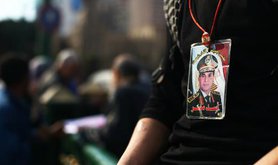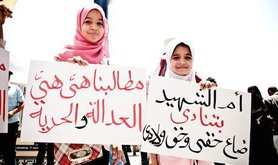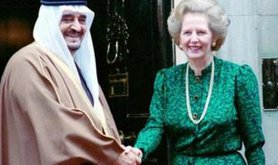Maryam al-Khawaja is the Acting President of the Bahrain Centre for Human Rights and Co-Director of the Gulf Centre for Human Rights. She comes from a family of prominent human rights defenders in Bahrain, with her sister having served and her father continuing to serve time as political prisoners.
David Wearing: Let’s start by talking about the legal situation with your dad and your sister. Where do things stand with them at the moment?
Maryam al-Khawaja: My father is sentenced to life imprisonment. He’s been through all the legal processes available in Bahrain. His sentence has been upheld at every level, right up to the end at the Court of Cassation. But of course, when we’re talking about the justice system in Bahrain, there isn’t really due process. Nor do you have any real insight into how the judiciary works because these are political decisions made outside of the courtroom. The courts are not independent, nor are they fair.
My sister Zainab got out of prison about a month ago after being in prison for approximately a year. She’s now facing three more court cases, so she could be arrested again at any point.
DW: Can you tell us something about the political demands they were making and the non-violent techniques they employed in their activism?
MK: My father has been a human rights defender for a very long time now. He’s been working on the ground there since 2001. And his demands were very much to do with human rights; demanding civil and human rights for all people in Bahrain. And his way of doing this was to create an awareness in society of what civil and human rights are.
So he would train the youth to work on their own chosen issues, helping to set up thematic committees that would work on a given issue and bring pressure on the government to deal with that issue. But of course, my father’s work wasn’t just limited within the borders of Bahrain. The amount of people he’s trained to work on human rights across the Middle East and North Africa is countless.
And this created a real threat to the regime, the fact that not only was he working on human rights but that he was also sowing the seeds so in the future there would be hundreds of other people doing the same thing. That’s why he was one of their main targets and why he’s sentenced to prison today.
Zainab is very well known for her use of non-violent methodology in dealing with the situation that you face in Bahrain on a day-to-day basis. Which is, for example, when you’re attacked by the police you don’t run, you stand your ground, which is scary, of course, it’s difficult and not anyone can do it, but for her, non-violence is an active thing.
It’s where you take the initiative and you go out and do things to create pressure but through non-violent means. So she’s done things like stand in front of riot police jeeps to prevent them from going into villages where they were attacking people. She’s stood in front of riot police when they were attacking protestors and refused to leave. She’s been arrested, she’s been beaten. So for her that was the main thing – learning from people like Gandhi and Martin Luther King Jr and others who used non-violent tactics and applying them to Bahrain.
DW: Most of our readers will be aware that Bahrain was one of the countries that saw mass, popular uprisings in the spring of 2011, which were then forcibly put down by the regime, with the backing of Saudi Arabia and its Gulf allies. How have things developed since then in the country, in terms of the challenge to the regime and the regime’s response?
MK: Well the protests themselves have not stopped, although they’re no longer being covered by the media as they were in 2011. We’re seeing protests on an almost daily basis in Bahrain. And just as the protests haven’t stopped, the regime’s human rights violations haven’t stopped either. In fact the human rights situation has deteriorated. People still see their homes raided, they’re still arbitrarily arrested.
But the Bahraini regime is developing its tactics for cracking down on people. For example, the number of terrorism cases they’re bringing now is staggering for a country with a population of citizens [i.e. excluding migrant workers] of 600-700,000 people. In 2013 alone there were 328 people tried on terrorism charges, 231 of whom were sentenced to a combined total of 2,500 years in prison, on evidence based on torture and secret sources. So we’re looking at numbers that don’t even make sense.
DW: Because it bears no relation to the level of violence in the country?
MK: Exactly. And at the same time as the government is making these claims, it’s also saying that it’s safe for the Formula One to come here.
Now, if we look very closely at the current situation, people are still living in a state of daily fear, daily repression. You never know if your home’s going to be raided. You never know if you’re going to leave the house one day and not come back because you’ve been arbitrarily arrested. You never know if a member of your family’s going to go missing. And when you zoom out and look at the bigger picture, the regime is still denying people their right to self-determination, which is guaranteed under the UN Universal Declaration of Human Rights. And in this they’re being backed by the Gulf Cooperation Council (GCC) [a group of monarchical regimes comprising Saudi Arabia, Bahrain, Kuwait, Qatar, UAE and Oman].
In the recent bombing which killed three policemen (into which BCHR demands that there is a full, impartial investigation to establish the truth of what happened) it emerged that one of those killed was a UAE national. It was very frustrating for us as human rights defenders that this aspect of the story was overlooked – the fact that we now have foreigners, in Bahraini riot police gear, in villages suppressing pro-democracy protests. So now we know that there are Emirati officers, but how many? How many Saudis are there? How many Qataris?
DW: For the benefit of our British readers, can you explain from your perspective what the role the UK government has here? Clearly Britain continues to arm and support the regime, and whenever asked about the situation it speaks positively about the dialogue that’s supposedly been taking place, the need for reform, and so on. What value does the regime place on the support that Britain gives to it?
MK: The British role in Bahrain is something that goes way, way back. For many Bahrainis when you talk about the British role in the country, one of the names that comes up is Charles Belgrave, the “special advisor” to the ruling family [who from 1926 to 1957 essentially ran the Bahraini government and was head of the police force and personally operated its courts]. And the second name that comes up is Ian Henderson, [the former colonial official who worked with the regime from 1966 to 2000] who is alleged to have set up the entire torture system and mechanics in the country. This is important because it leaves people with a kind of background view of the British involvement in Bahrain.
Now looking at the situation today, while it’s easy to say that western countries have double standards on human rights violations in the Middle East and North Africa, the worst country of all in terms of foreign policy towards Bahrain is the UK. William Hague is able to say, with respect to Sri Lanka, that while it takes time for a government to implement a reform process the most important thing, the pivotal thing, is the political will to do it, and this is what is lacking.
Well it’s the exact same situation in Bahrain, and yet you will not hear a single British official saying that about Bahrain. On the contrary, they’ll defend the regime, saying that they need time to implement reform, and if other countries take a stance [against the Bahraini regime’s human rights record] the UK will usually try to counter that stance by saying “no, no, no, you need to give them time, they’re trying”, and so on and so forth.
I think the relationship between the United Kingdom, and not just Bahrain, but the entire Gulf regime is very troubling. The fact that they have such a strong financial dependency on the Gulf is very troubling. In the twentyfirst century you would hope that human rights would be more important than economic relations, but with the UK that doesn’t seem to be the case at all.
The UK does have a good stance towards some other countries, like Sri Lanka for example, but in the case of Bahrain it’s like it’s an entirely different government, especially in terms of their reactions. Of course there are people who have taken good stances: MPs like Katy Clark, Andy Slaughter and others who have spoken out about the situation, asked questions in Parliament. But there are others who are more than prepared to lobby for the Bahraini government.
The regime has employed up to thirteen PR companies in the past three years alone, and it’s very telling how much they care about their international reputation. It’s incredible the number of former UK diplomats to Bahrain that I’ve met who are now working on PR for Bahrain, who have become lobbyists. It’s very telling about the relationship that exists during their stay in Bahrain, the fact that they then lobby for the regime once they come back to the UK.
One last point: it was a real slap in the face for people in Bahrain when the King said to the British “why did you leave us [when the UK pulled out of the Gulf in 1971]? No one asked you to leave”. For Bahrainis who have since the 1920s fought for civil rights and against colonisation, for the people who died fighting, that was a real blow. Again, it’s very telling of the relationship between the Al-Khalifas [the ruling family] and the British. It’s a relationship where the Al-Khalifas feel as though the government here protected them from the population in Bahrain, and that’s something that they miss and want back.
DW: The Bahrain Grand Prix is coming up on 6 April. What benefit does the regime perceive in hosting it? Why do they value the Grand Prix so much?
MK: As I mentioned, the regime employs a lot of PR companies and cares a lot about its international reputation. Bahrain is very dependent on international investment. If they can’t say that things are back to normal, that it’s business as usual in Bahrain, it means they lose that investment. One of the best ways to whitewash human rights violations and to portray the situation in the country as fine is to host an international sporting event (which of course contradicts the narrative about terrorism that I mentioned earlier).
We’re constantly asked as human rights defenders, “why do you make this connection between human rights and sporting events? If we did this throughout the world we wouldn’t have any sporting events”. Well the difference is that in Bahrain, Formula One actually causes human rights violations. We’ve had people killed during the race to try and prevent protests. We’ve seen women arrested, severely tortured, stripped naked and sexually assaulted. We’ve had people beaten on the streets, we’ve had mass arbitrary arrests, before, during and after the race. And these are all things that are happening because the race is being held.
So it’s very disappointing that the FIA and Bernie Ecclestone, because of the money involved, are willing to overlook the human rights situation; they’re willing to overlook the fact that there are five young children who no longer have a father because their Formula One race had to happen. God knows how many more people we’ll lose before they come to the realisation of what their sporting event is causing in Bahrain.
DW: Ok, finally for people in Britain who are concerned about this - concerned about the fact that our government’s complicit in what’s happening in your country, the fact that British firms are involved in the Grand Prix, for people who want to help, who want to do something, who don’t want to be complicit in all of this - what would you ask those people to do?
MK: I think there’s a lot of things that people can do. I mean, these days it’s as easy as tweeting 140 characters, which is something anyone can do from anywhere. In terms of specifics, there are three Early Day Motions in the British Parliament at the moment. EDM 1194 relates to the upcoming Grand Prix. If people could start contacting their MPs and telling them “we need you to sign on to this”, that would be very helpful. Then there’s EDMs 901 and 1081, which are about the broader human rights situation in Bahrain. Again, people can call their MPs and ask them to sign those, and that would be very helpful indeed.
Another thing would be raising awareness, of course. I believe that there are a lot of people who genuinely don’t know what’s going on, and if they did they would care but they just don’t have that kind of information. So making sure that people around you know what’s going on always makes a difference, because Bahrainis are in such small numbers abroad, in places like the UK, that it’s not easy for us to raise awareness, to bring pressure on the government here.
And one last thing would be to write letters of complaint to MPs and to the British government, asking why they continue to support a regime that commits human rights abuses on a daily basis, and why it is that the UK continues to have double standards when it comes to their allies committing human rights violations. I always say, if you want to judge whether a government has good human rights standards, don’t judge by how they apply those standards to their enemies. Judge by how they apply them to their allies.
Read more
Get our weekly email




Comments
We encourage anyone to comment, please consult the oD commenting guidelines if you have any questions.